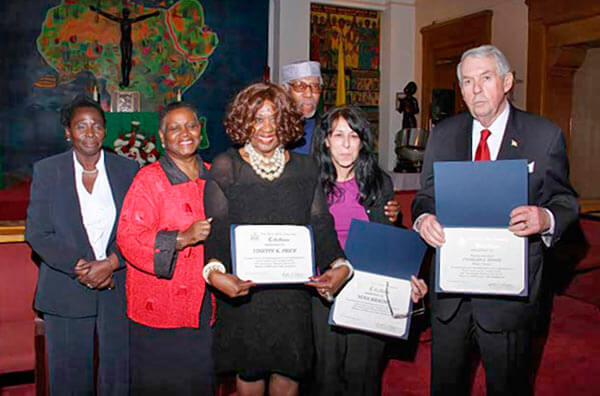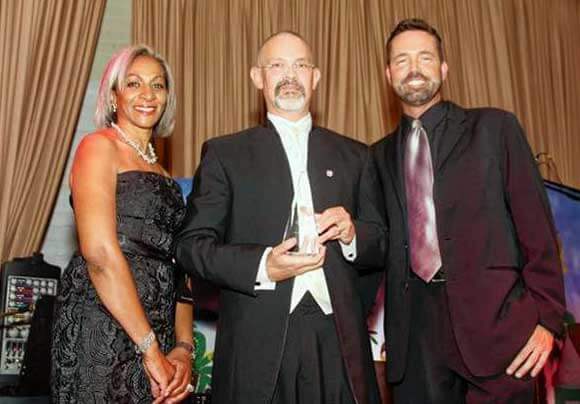Jean Griffith-Sandifford will never forget the phone calls she received late Dec. 19, 1986.
They were relentless continuing through Dec. 20 informing her of the brutal murder of Michael, her 23-year-old son who was killed in Howard Beach.
Michael and passengers — Timothy Grimes and Cedric Sandifford were driving through the Queens neighborhood Beach when their car broke down.
In an attempt to get the vehicle moving they walked to find a service station. They stopped at a pizzeria and there a tragedy unfolded.
Reportedly, simultaneous to that event a birthday party in the same community invited teenagers for a good time. The revelry was diverted when an 18-year-old Jonathan Lester sounded an alarm to his friends that “niggers are on the boulevard.”
Court records revealed Lester also shouted “kill the niggers.”
More than a dozen partying teens piled into cars to find the Black intruders. Armed with bats and other potential instruments of destruction they answered the call to action with pursuit to find the men.
Grimes managed to elude the bat-wielding racists.
Sandifford, a native of Guyana was pummeled with an iron pipe.
And although Michael ran for his life, in desperate attempt to elude the predators he raced into traffic along the Belt Parkway.
Jean, Griffith’s mother was spared from seeing his mangled body.
Her eldest son Christopher took charge opting to boldly identify the body of his beloved brother.
From that fated December date, Jean’s phone rang incessantly.
Media outlets all but camped outside Griffith’s home and church — some reporters followed her to and from hospitals, to the Kew Gardens courthouse etc.
The racist tale made national news and became topical on the leading talk shows of the era with hour-long analyses on the Phil Donahue, Oprah Winfrey, Geraldo Rivera shows about the state of racism in America.
Director Spike Lee even dedicated his 1989 “Do The Right Thing” movie to the memory of Michael Griffith.
According to Griffith’s mother, activist Sonny Carson was first to visit her home.
He vowed to protest the killing and called for a “day of outrage” to highlight the plight of Blacks in New York City.
Last Monday, Oct. 23, Michael Griffith’s mom, Jean said her phone rang with the same urgency as it did 31 years ago.
The first call came from the New York Times.
Numerous news outlets followed.
They all informed her that Lester had killed himself.
“I hope he will rest in peace,” she said.
The still grieving mother added that she would pray for Lester’s family.
More poignant was that she also said she had long forgiven the teenager who incited a mob to cause the death of her son.
It is the same forgiving response she gave after the incident, throughout the trial and during these past 31 years.
A devout Christian, Jean has never admonished Lester or any of his many accomplices.
She has always maintained that painful as her loss would “leave it in God’s hands.”
Despite the fact more than 12 formed the mob, a majority plead guilty, testified against their friends and for that were able to accept lesser charges of assault instead of murder while Scott Kern, Michael Pirone, Jason Ladone and the ringleader Lester were charged with manslaughter.
Pirone who was accused, confessed he was present at the scene but did not follow through with Lester’s command.
He pleaded that he was injured and “couldn’t run.”
Pirone was the only defendant to win an acquittal.
During the trial Pirone wrote an apology to Jean.
Along with Lester, Ladone and Kern were convicted.
Lester served 15 years of his 15- to 30-year manslaughter sentence in the racially charged murder and on May 29, 2001 was released and summarily deported to his native England.
Lester died there at age 48.
“I bitterly regret what I did,” Lester had said in an interview with a London newspaper after his release from prison. “But I don’t suppose I will ever escape my past.”
Lester, nicknamed “Johnny English,” lived in Lancashire and according to his sister Jayne Lester suffered from depression due to the infamous and inflammatory murder case.
The New York Times learned about the suicide from a Facebook posting she recently made explaining that she had just returned with her brother Jon’s ashes to America.
“At last, he will be at rest in the USA where his heart was and always wanted to be.”
The newspaper reported that Lester died on Aug. 14 but did not detail the circumstances that resulted in his demise.
Jayne’s social media postings also emphasized a contention that her brother was wrongly convicted and that he was never a racist but used as a pawn by politicians.
Jean said Lester had sent her a card and letters while he was in jail.
She said he reached out numerous times and even wrote “an ode to Jean” an expressive tribute which could have also applied to his mother also named Jean.
Throughout the trial in 1988, he showed no remorse and during sentencing was chastised by Judge Thomas Demakos for showing “no guilt” “no fear” nor shame.
“I was very young when it all happened. I didn’t know what I was doing,” Lester said in retrospect at age 32.
He also insisted that the fiasco escalated because he “was just a cocky teenager who lost control.”
Lester allegedly stated that he aspired to being “a capo” in the Mafia.
And perhaps a response condolence posting by Victoria Gotti, daughter of deceased mobster John Gotti who was also Lester’s neighbor might have been the magnet that alerted the popular daily newspaper of the suicide.
Jayne blames her brother’s death on the fact he was plagued by misery from the tragedy and the realization that he could never return to America where he grew up.
She allegedly said he had suffered sleepless nights, nightmares and regularly expressed regret about the night he led a group of thoughtless and uncaring colleagues to a race to commit murder.
“I know this race thing is following me wherever I go, but I have never been a racist,” Lester reportedly stated. “There was certainly no racial element in it, as I recall,” Lester told London’s Sunday Mirror.
“It was only the politicians that turned it into one.”
Father to three children, Lester reportedly tried to reform himself and reportedly stated — “I found the whole thing sickening. I have never been a racist, no matter what people say or think.”
“In jail in America, I met many Black people who I am proud to call my friends.”
In England he dated dark-skinned women and commented “If my girlfriend can live with what I did, why can’t everyone else?”
Lester said he had read that Michael had two sisters — Odette and Brenda.
Brenda, Jean and Cedric’s only child was just five years old when her father was brutally attacked.
“I have two sisters” — Julia and Jayne, he reflected, “It was Christmas week. I thought I had ruined Christmas. I had probably ruined Christmas for the Griffith family forever.”
He was right, the TT native explained that Christmas has not been the celebratory holiday season the Griffith family relished since migrating from the Caribbean.
Once a busy period of shopping, baking sweet bread, making sorrel, mauby and ginger beer and scurrying from house to house to visit friends, the routine ceased three decades ago.
“With Michael gone, it’s not the same, I just don’t feel it.”
Forced to reflect on the happiest of times with Michael, Jean immersed herself with volunteerism.
Most notably, she campaigned to see special prosecutor Charles Joe Hynes emerge a Brooklyn district attorney.
She also she reached out to politicians — Assemblywoman Annette Robinson, Cong. Major Owens and City Councilwoman Tracy Boyland — in order to petition for a Brooklyn thoroughfare to be named in honor of her son.
She walked through the Albany houses and easily obtained 1,000 signatures.
“People were kind and I had no problem at all.”
In 1999, Pacific St. (between Albany and Ralph) was renamed Michael Griffith Street..
Sandifford whom she married, was an Army veteran.
She continues to volunteer at the veteran’s hospital.
Along with her family, she annually fed the homeless using her own funds.
Although each anniversary seems a perilous period to reflect, the family has held three commemorative events to celebrate Michael’s short years.
The first held at Rev. Herbert Daughtry’s House of the Lord Pentecostal reunited Pirone’s attorney Stephen Murphy, and community activists in prayerful celebration of two Caribbean men who met racism head on.
The second, on the 25th anniversary of the heinous murder was highlighted by presentation of lucite awards to DA Hynes, Robinson, Nina Krauss, the foreperson on the jury, this Insider and others.
Last year on the 30th anniversary she repeated the gesture acknowledging 11 individuals she believed toiled to winning justice for the two men she still grieves.
Catch You On The Inside!
























